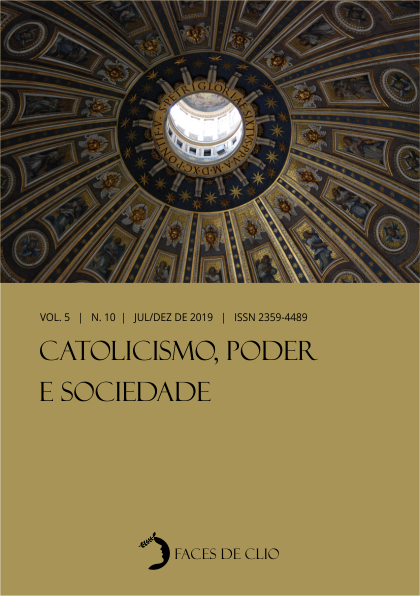O Social Catolicismo e a sua atuação no meio rural na segunda metade do século XX no Brasil
DOI:
https://doi.org/10.34019/2359-4489.2019.v5.28716Palavras-chave:
Igreja Católica, reforma agrária, Doutrina Social da IgrejaResumo
Na segunda metade do século XX, o Brasil sofreu profundas transformações sociais no meio rural. O problema da falta de acesso à propriedade da terra, vivenciado por milhões de brasileiros foi, aos poucos, se tornando um tema bastante debatido entre vários setores da sociedade. Dentre eles, a Igreja Católica que, preocupada com os rumos que a discussão estava tomando e com o intuito de se antecipar à revolução, convocou, em setembro de 1950, a I Semana Ruralista realizada na cidade de Campanha (MG). Durante os anos seguintes, o debate sobre a reforma agrária foi ganhando cada vez mais espaço dentro do seu corpo hierárquico. Em 1951, foi publicada a pastoral coletiva assinada por 113 bispos. Em 1952, os arcebispos, bispos e prelados, do Vale do São Francisco se reuniram em Aracaju. Em setembro de 1954, a II Assembleia Geral da CNBB lançou o primeiro documento sobre o tema: A Igreja e a reforma agrária. Em 1956, os bispos nordestinos se reuniram na cidade de Campina Grande (PB) e, em 1959, na capital do Rio Grande do Norte. A partir de 1960, os encontros dos bispos passaram a ser convocados pela própria CNBB. Em dezembro de 1960, ocorreu o encontro dos arcebispos e bispos da Província Eclesiástica de São Paulo. Em 1960, o professor Plínio de Oliveira, juntamente Dom Castro Mayer, bispo de Campos (RJ) e dom Geraldo Proença Sigaud, bispo de Diamantina (MG), se posicionaram contrários à proposta de reforma agrária que estava sendo elaborada pela CNBB. Em julho de 1961, foi a
vez dos bispos do Vale do Rio Doce, no Estado de Minas Gerais. Em outubro de 1961, o presidente da CNBB, Dom Jaime Câmara, convocou a Comissão Central da CNBB para refletir sobre a publicação da encíclica Mater et Magister . Em 30 de abril de 1963, a Comissão Central da CNBB voltou a se pronunciar motivado pela publicação da segunda encíclica de João XXIII, Pacem in Terris. Durante o governo de João Goulart (1961-1964) foi aprovado o estatuto do trabalhador rural e, a Igreja, apoiou as Reformas de Base. A pesquisa seguirá a ordem cronológica dos fatos que ocorreram entre os anos de 1950 e 1964 e serão feitas uma análise dos documentos eclesiais e bibliografias sobre o assunto.


